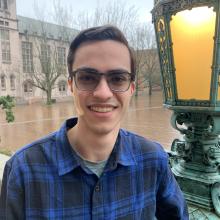We have five Masters students active in MELC this year. They are important players in the department, providing teaching and research assistance to faculty and learning support to students.
Please reach out to them if, on the one hand, you have questions about being a Masters student in MELC, or, on the other hand, if you can help them with their research interests!
Forrest Martin
Forrest Martin is in his final year of the MELC M.A. program. He received his B.A. summa cum laude in Hebrew Bible & Ancient Near Eastern Studies with a second major in Greek from the University of Washington. He is fascinated by the artistry of ancient texts.
His academic interests include a variety of ancient Near Eastern and North African languages and literatures, particularly as they relate to ancient religion and conceptions of cosmology. Ancient languages that he has studied include Hebrew, Hieroglyphic Egyptian, Greek, Ugaritic, and GeꜤez. His thesis, “The World Turned Upside-Down,” examines the so-called “topsy-turvy motif”—a literary device characterized by radical reversals—and its function in ancient Egyptian and Northwest Semitic texts.
He has worked as a teaching assistant in a wide variety of MELC courses; he is also a graduate fellow for the Stroum Center for Jewish Studies. After his time at UW, Forrest intends to pursue a PhD, working at the intersection of biblical studies and Egyptology.
Cara Reed-Ferrara
Cara Reed-Ferrara is a second year MA student in MELC with Iranian Studies, studying Persian and Arabic.
Their research focus is on the relationship between Getino and Solanas’ Third Cinema movement and its absence in the Iranian cinematic tradition, looking at Palestinian Third Cinema in comparison. They explore the relationship between anticolonial movements and leftist ideology; as well as the relationship between anticolonial rhetoric and the Islamic Republic following 1979 and how that has affected leftist discourse in Iran; while unpacking why Iranian resistance cinema has been primarily targeted at its own government, as opposed to the imperial powers of Britain, the US, or Russia; and how these three things tie together.
Jack Robinson
Jack Robinson is a 2nd year MA student in the MELC Department. He is planning to write his Master’s thesis on a topic related to Arab migration to the United States, specifically regarding the Lebanese and/or the Palestinian diasporas. What drew him to MELC was their emphasis on language study, where Arabic and Hebrew are his primary and secondary languages, respectively. He is also interested in topics such as religious nationalism and the intersections of religion and government, along with scriptural interpretation.
Elyakim Suissa
Elyakim Suissa is a first year MELC MA student studying Jewish history in the Ottoman Empire during the sixteenth and seventeenth centuries. In his research, Elyakim focuses on themes of rabbinic structure and intercommunal dynamics, specializing in rabbinic legal documents. Elyakim works with source material in Hebrew and Turkish, and is currently learning Arabic and Judeo-Spanish, the spoken language of Iberian Jews living in Ottoman territory.
Elyakim completed his BA in History at the University of Pennsylvania with Professor Oscar Aguirre-Mandujano, and in the process produced a thesis on seventeenth-century Jewish-Muslim relations as seen in rabbinic responsa published in Istanbul. Now, Elyakim is working with Professor Selim Kuru, the Director of Turkish and Ottoman Studies at MELC, to produce a Master’s thesis with new content along the same line of research.
In his free time, Elyakim is active in the Jewish communities of Seattle. He also enjoys playing video games and going on nature walks with good friends.
Brianna Voss
Brianna Vosss is in the first year of the MA program here in the MELC department and her major is Arabic and Islamic Studies. Brianna graduated with a BA in Linguistics and Arabic Language in 2019 from Wayne State University in Detroit, MI.
Brianna is currently choosing between two topics for her MA thesis. The first topic is ambiguity in the Quran and the implications of this in translation and interpretation. The second topic is Egyptian mahraganat music as a form of counterculture resistance in the wake of the 2011 Egyptian revolution and the political and social implications of this. Although she is no longer studying linguistics as her major, it is still an important component in how she approaches her studies and it has significantly influenced the direction she has taken in her education. Brianna is excited to be continuing her education at the University of Washington and looks forward to her next few years here!
Kathryn Medill




